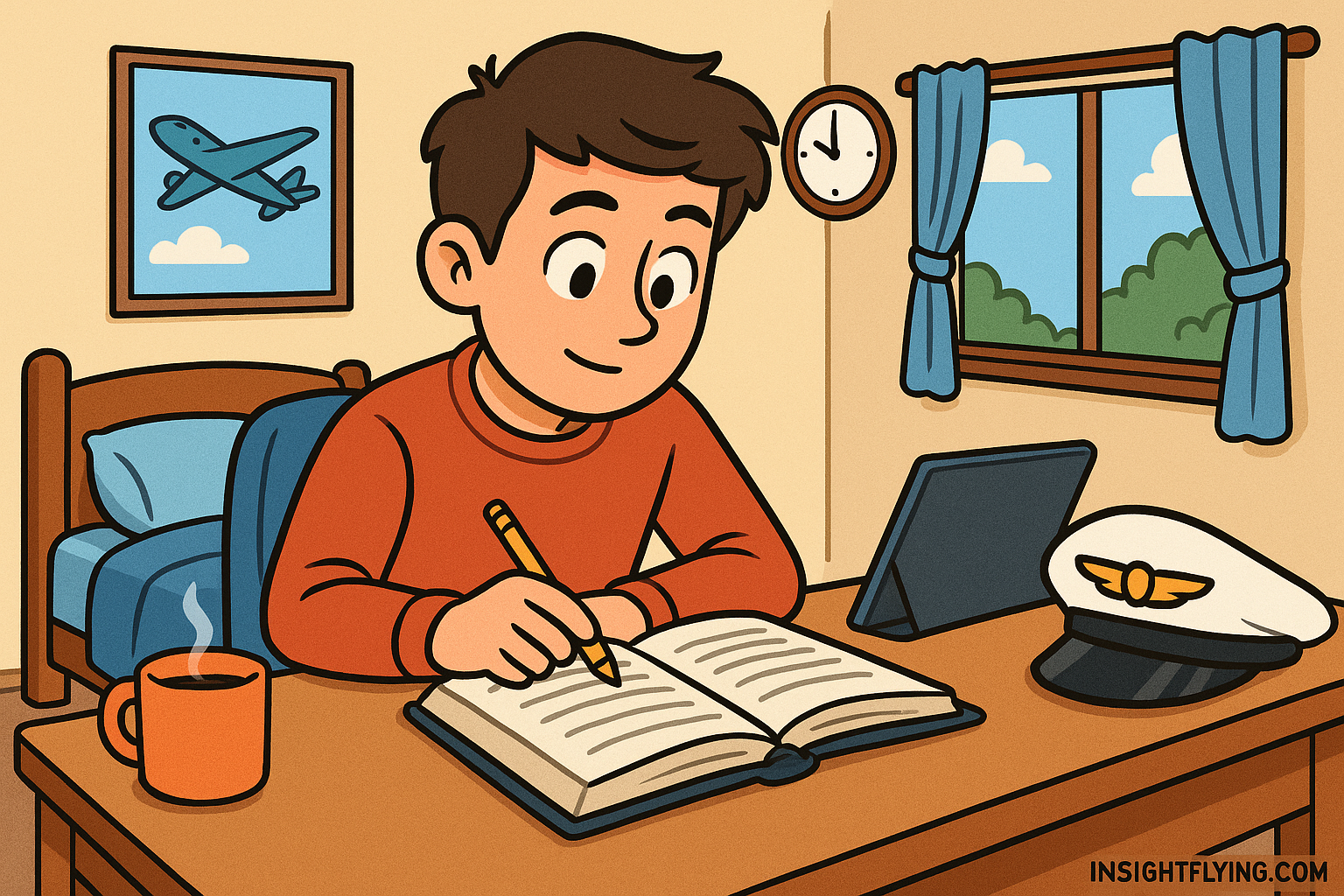ในการสัมภาษณ์นักบิน สิ่งที่กรรมการมองหาไม่ได้มีแค่ความรู้ด้านเทคนิคหรือทักษะการบินเท่านั้นครับ แต่ยังรวมถึง ลักษณะส่วนบุคคล ที่สะท้อนว่า ผู้สมัครมีศักยภาพในการพัฒนาไปเป็นนักบินอาชีพได้จริงหรือไม่ ปัจจัยเหล่านี้สามารถแบ่งออกเป็น 4 ด้านหลัก หรือที่เรียกว่า Key Personal Factors ได้แก่
- Motivation – แรงจูงใจและแรงผลักดัน
คำถามยอดฮิตคือ “ทำไมถึงอยากเป็นนักบิน?” ดูเหมือนง่าย แต่จริง ๆ แล้วกรรมการใช้คำถามนี้เพื่อเจาะลึกว่า แรงบันดาลใจของผู้สมัครนั้นเป็นของจริงหรือเพียงคำพูดสวยหรู- Driving Forces: ความใฝ่ฝัน ความมุ่งมั่น หรือแรงบันดาลใจจากประสบการณ์
- Curiosity: ความใคร่รู้ อยากเรียนรู้ อยากค้นหาคำตอบในสิ่งที่ยังไม่รู้
- Courage & Energy: ความกล้าและพลังที่จะก้าวข้ามอุปสรรค ไม่ใช่ความกล้าแบบบ้าบิ่น แต่คือความกล้าที่มีเหตุผล
- Family Context – พื้นฐานครอบครัวและการเติบโต
ครอบครัวไม่ได้หมายถึงฐานะร่ำรวย แต่คือ “รากฐานทางจิตใจและการอบรมสั่งสอน”- ผู้ที่เติบโตมาในครอบครัวที่ไม่สมบูรณ์ เช่น กำพร้า หรือมีปัญหาทางบ้าน ไม่ได้ถูกมองว่าติดลบเสมอไป
- สิ่งที่กรรมการมองหาคือ ความแข็งแรงทางจิตใจ การยอมรับความจริง และการปรับตัวเป็นผู้ใหญ่ที่มีความรับผิดชอบ
- Learning Context – ความสามารถในการเรียนรู้และปรับตัว
การเป็นนักบินหมายถึงการเรียนรู้ตลอดชีวิต กรรมการจึงประเมินว่า ผู้สมัครมีศักยภาพในการเรียนและพัฒนาตนเองอย่างไร
ปัจจัยที่มักถูกพิจารณา:- Memory (ความจำ): ทั้ง short-term และ long-term memory เช่น การจดจำคำสั่ง ATC ในระยะสั้น
- Listening & Thinking: การฟังอย่างเข้าใจ และการคิดเชิงตรรกะ (Logical Reasoning)
- Observing: ความสามารถในการสังเกตสิ่งผิดปกติ เช่น เสียง กลิ่น การสั่นสะเทือน หรือไฟเตือนในห้องนักบิน
- Basic Skills: การอ่าน การเขียน และการสื่อสาร
- Social Context – สถานภาพและการเข้าสังคม
นักบินไม่สามารถทำงานเพียงลำพัง การทำงานเป็นทีมกับนักบินร่วมเที่ยวบินและลูกเรือเป็นสิ่งสำคัญมาก- ในปัจจุบัน การสอบมักมี Group Test เพื่อวัดความสามารถในการสื่อสาร การแสดงความคิดเห็น และการทำงานเป็นทีม
- คนที่ “รักสันโดษจนเกินไป” มักมีปัญหาในการทดสอบลักษณะนี้ เพราะขาดทักษะด้าน Relations, Networking, Communication, Teamwork
สรุป
Key Personal Factors ไม่ได้เป็นเพียงเกณฑ์การประเมินในห้องสัมภาษณ์ แต่ยังสะท้อนว่า ผู้สมัครมีคุณสมบัติที่พร้อมจะเติบโตในอาชีพนักบินหรือไม่ การเตรียมตัวที่ดีจึงไม่ใช่เพียงการอ่านหนังสือสอบ แต่รวมถึงการฝึก คิด ฟัง พูด สังเกต ปรับตัว และทำงานร่วมกับผู้อื่น อย่างมืออาชีพ
Key Personal Factors in Pilot Interviews
During a pilot interview, examiners are not only evaluating technical knowledge or flying skills. They also assess personal characteristics that reflect whether a candidate has the potential to grow into a professional pilot. These characteristics can be grouped into four main areas, known as Key Personal Factors:
1. Motivation – Drive and Inspiration
One of the most common questions is: “Why do you want to become a pilot?”
It may sound simple, but in reality, examiners use this question to explore whether the candidate’s motivation is genuine or just a rehearsed answer.
Key elements include:
- Driving Forces: Dreams, ambitions, or strong inspirations.
- Curiosity: A desire to learn, discover, and seek answers.
- Courage & Energy: The ability to face challenges with determination—not reckless risk-taking, but rational courage backed by effort and persistence.
✨ Example: A candidate who shares a real story about being inspired by a pilot solving an emergency situation, or being fascinated by their first flight experience, is often more convincing than someone who gives a superficial textbook answer.
2. Family Context – Background and Upbringing
Family does not mean wealth—it refers to emotional foundation and upbringing.
- Candidates from incomplete families, such as orphans or those raised by grandparents, are not automatically judged negatively.
- What examiners look for is resilience, emotional strength, and maturity—whether the candidate accepts reality, adapts, and takes responsibility.
✈️ Key point: Family background is not a decisive factor. It simply helps the panel understand how the candidate has developed into who they are today.
3. Learning Context – Ability to Learn and Adapt
A pilot’s career is all about continuous learning. Examiners want to know whether the candidate can effectively absorb, retain, and apply new knowledge.
Areas of assessment include:
- Memory: Both short-term and long-term, e.g., remembering ATC instructions.
- Listening & Thinking: Understanding communications accurately and applying logical reasoning.
- Observing: Quickly noticing abnormalities—sounds, smells, vibrations, or warning lights.
- Basic Skills: Reading, writing, and effective communication.
✅ This is why aviation emphasizes the use of checklists—to reduce memory workload and ensure systematic, error-free operations.
4. Social Context – Social Skills and Teamwork
Pilots never work alone. The ability to cooperate with co-pilots, cabin crew, and ground staff is critical.
- Modern selection processes often include Group Tests, where candidates are observed in discussions, problem-solving, and teamwork exercises.
- Those who are overly solitary may struggle, since this stage evaluates relations, networking, communication skills, and teamwork.
✍️ Takeaway: Building social skills—knowing how to communicate, share opinions, and work as part of a team—is essential for a successful aviation career.
Conclusion
Key Personal Factors are not just criteria for the interview—they reveal whether a candidate has the right foundation to succeed as a professional pilot. Preparation should go beyond studying books: it should also include training in thinking, listening, speaking, observing, adapting, and working with others at a professional level.
A350 accident Airbus aircraft airline airmanship attitude aviation Aviation SMS become a captain become a pilot Boeing Crisis Crisis Management diversion emergency engine fatigue flight safety flood go-around Indigo interview judgement management motivation pilot pilot interview qualified pilot safety safety management Safety Management System safety report SMS student pilot technology turbulence weather การจัดการความปลอดภัย การจัดการภาวะวิกฤติ การบิน การสอบสัมภาษณ์ นักบิน ระบบบริหารความปลอดภัย สอบนักบิน

